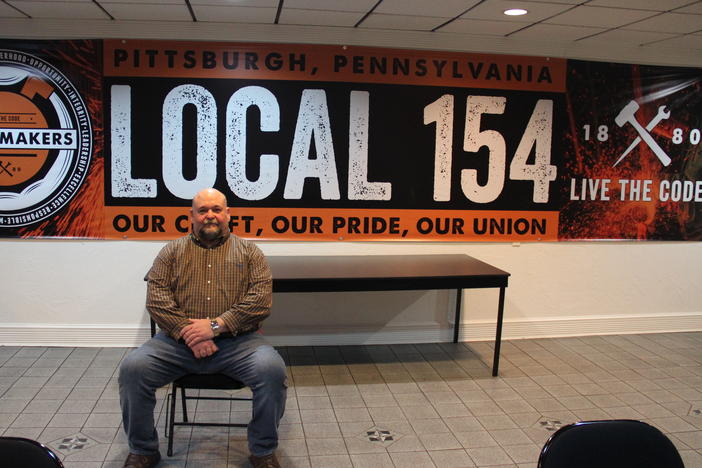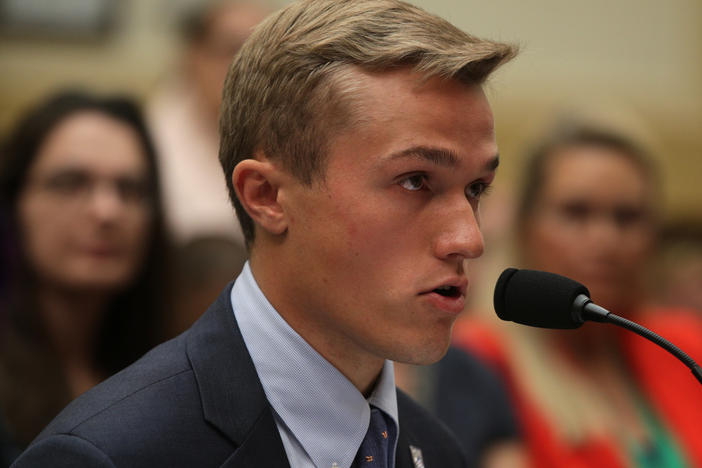Section Branding
Header Content
Developer Abandons Keystone XL Pipeline Project, Ending Decade-Long Battle
Primary Content
TC Energy suspended construction in January when President Biden revoked a key permit. The controversial project was a major flashpoint in the debate over fossil fuels' role in climate change.
Transcript
AILSA CHANG, HOST:
The company behind the controversial Keystone XL oil pipeline is officially terminating the project. That announcement ends a more than decade-long battle over whether the pipeline should even be built. NPR's Jeff Brady has been following the controversy for most of the past decade and joins us now.
Hey, Jeff.
JEFF BRADY, BYLINE: Hey, Ailsa.
CHANG: Ok, so what did the company say today?
BRADY: Well, TC Energy is the company. They used to be called TransCanada. And they said after reviewing options and after consulting with their partner on the pipeline - that's the government of Alberta, one of the partners - they are terminating the project. It's dead, and it's not likely to be revived. The company had stopped construction back in January, when President Biden revoked a key cross-border permit. It was assumed back then that the $8 billion project wouldn't happen, but this makes it official.
CHANG: Wow. All right, well, tell us how environmental groups have been reacting to today's announcement because I know that they've been fighting this project for a really long time.
BRADY: Yeah, the reactions are nothing short of jubilation. And an attorney with the Center for Biological Diversity called this a landmark moment in the fight against the climate crisis. The Keystone XL - you know, it's become to symbolize a lot more than what it was. It's not just the pipeline transporting oil sands - some called it tar sands crude - from landlocked Alberta down to the U.S. Gulf Coast, where it could get onto the world market. It really became a symbol of whether big new fossil fuel projects could be stopped. And over the last decade, we've seen this keep it in the ground movement emerge, scientists say, to avoid the worst effects of climate change. Most of the known fossil fuel reserves have to be left in the ground. And environmentalists really put all their chips on stopping this project, and they succeeded.
CHANG: They sure did. Well, how is the oil industry responding to this decision to terminate the project?
BRADY: Yeah, this is a big loss for them. The American Petroleum Institute put out a statement saying, this is a blow to U.S. energy security and a blow to the thousands of good-paying union jobs the project would have supported. The industry has argued all along that big projects like this create a lot of jobs, and they say pipelines are the safest way to transport crude oil. That argument worked for former President Trump. He revived the Keystone XL after President Obama blocked it. Now that political back-and-forth is over.
CHANG: Well, can we just talk a little more about the kind of oil this pipeline would have transported because from what I understand, it's not the kind of crude oil that comes from a typical oil well, right?
BRADY: No, it's not. This oil sands crude - it has to be mined. And I visited one of these sites up in Alberta, and it was this huge hole in the ground. It looks like something you see at the Grand Canyon. And it doesn't come out of the ground as liquid. It's this gunky substance that has the consistency of Play-Doh. And because of that, it requires extra processing to turn it into crude oil. That processing emits more greenhouse gases than even traditional oil production, and that's one of the reasons why this kind of crude has been so controversial.
CHANG: Well, the world is talking a lot more about climate change than even when this project was launched more than a decade back. What do you think this decision means for climate efforts?
BRADY: You know, I talked with Jane Kleeb at the group Bold Nebraska, which really started this campaign against Keystone XL because landowners there didn't want the pipeline crossing their property. She said this announcement today means early predictions that a big pipeline from a big company can't be stopped - that's just not true. And that's going to embolden pipeline opponents across the country.
CHANG: That is NPR's Jeff Brady.
Thank you, Jeff.
BRADY: Thank you. Transcript provided by NPR, Copyright NPR.
Bottom Content



